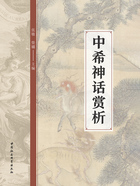
Introduction
What is Myth?
The word “myth” derives from Greek “mythos,” referring to an allegory or fable of certain important moral or religious truth,or some operation of nature.Mythology is a collective name,covering a series of historical myths and narratives of gods,demigods and heroes,which were current among the heathen in ancient times.[1] Scholars at home and abroad have,by this definition,divergent views on this term.In the preface of A Contribution to the Critique of Political Economy,Karl Marx holds that “all mythology masters and dominates and shapes the forces of nature in and through the imagination;hence it disappears as soon as man gains mastery over the forces of nature.”[2] Northrop Frye defines myth as “a narrative in which some characters are superhuman beings who do things that ‘happen only in stories’;hence,a conventionalized or stylized narrative not fully adapted to plausibility or ‘realism’.”[3] While Lewis Spence’s definition of myth is as follows:
A myth is an account of the deeds of a god or supernatural being,usually expressed in terms of primitive thought.It is an attempt to explain the relations of man to the universe,and it has for those who recount it a predominantly religious value;or it may have arisen to “explain” the existence of some social organization,a custom,or the peculiarities of an environment.[4]
Robert A.Segal’s proposition,nevertheless,seems utterly distant from the above scholars and challenges traditional definitions of myths.He holds that a myth should not be confined to a story,but be taken more broadly as a conviction or credo like the American “rags to riches myth” and the “myths of the frontier.” Myths include not only stories that happened in the past,but also those in the present or the future.[5]
Similarly,there are differences among Chinese scholars on the matter.In A Brief History of Chinese Fiction,Lu Hsun thinks that when primitive men observed natural phenomena and changes which could not be accomplished by any human power,they made up stories to explain them,and these explanations became myths.[6] In his further interpretation of the content of myths and their relation to culture,Lu Hsun believes that myths usually centered around a group of gods worshipped by men through descriptions of them and their feats,hymns in praise of their divine power,and offerings in their shrines.Such a belief brings with it gradual progress in culture.For not only are myths the beginning of religion and art but the fountain-head of literature.[7] Another famous Chinese scholar Mao Dun regards myths as a kind of folk tales in ancient times which record the narration of gods’ actions.These gods did not spring out of thin air,but were the inevitable product of the living and mental conditions of the primitive people.[8] Moreover,as one of the most distinguished modern mythologists,Yuan Ke’s scope of myth is in the broadest sense,in which fables,legends and mythic novels all can be called as myths.[9]
Aforementioned opinions are of great help to our summary of the characteristics of myths.First of all,most scholars believe that myth is an application of primitive people for their explanation of natural phenomena and changes beyond their understanding though some hold that it can also refer to happenings in the present and future.Secondly,myths show a feature of collectiveness.That means they were not created by one person,but were processed by different narrators who passed them down from generation to generation.Thus,these mythological stories,as a projection of the collective spirit in ancient times,usually have no specific author.The Homeric epics constitute one example,in which the stories had already existed long before the books were written.Thirdly,myths,normally carrying a message of ethics,religion or nature,embody the characteristic of holiness.Lastly,myths are always metaphorical.It is incarnated on the one hand in the mind-set of mythmaking and,on the other hand,its great influence upon language.Ancient people believed that the unexplainable natural phenomena such as thunder and lightning,wind and rain,human death,were controlled by corresponding gods in their imagination.Our daily language is also deeply imprinted with mythological metaphors.For example,Chinese tend to describe a pathbreaker with sheer will-power and persistence as “someone with the spirit of Yu who tamed the flood”;while in English,“Adonis” is code for a handsome man;“Pandora’s box” symbolizes the root of disasters;and “Achilles’ heel” indicates one’s fatal weakness.